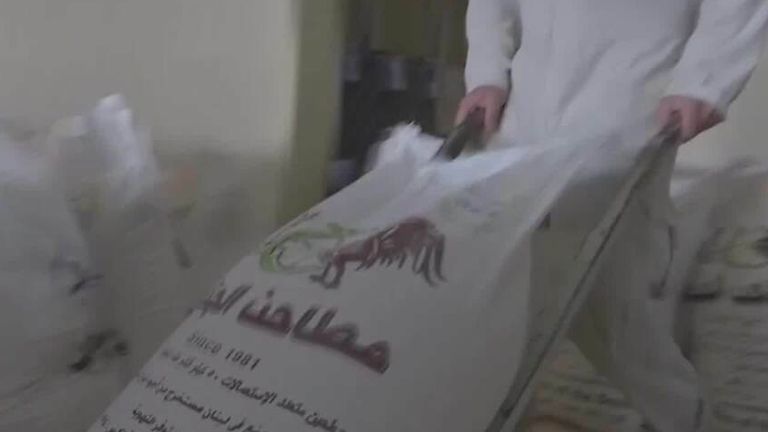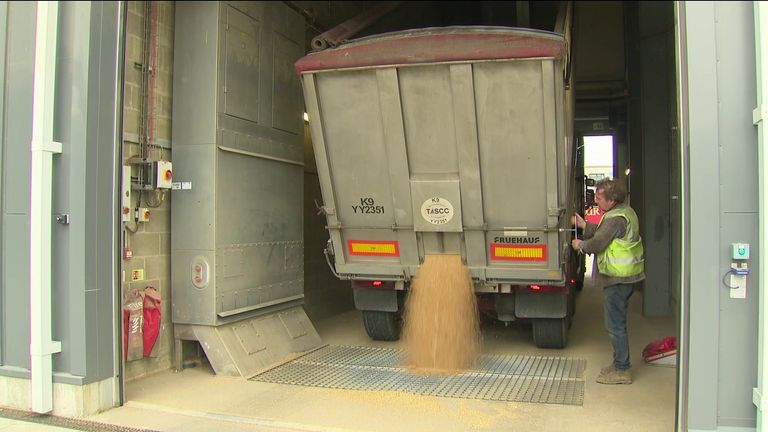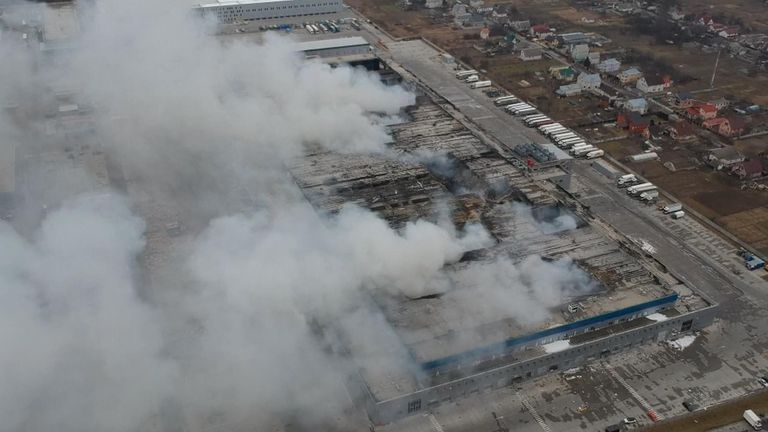Ukraine war: Why the Russian invasion is leading to global food shortages
The price of wheat shot up immediately after Russia attacked its neighbour - and now Ukraine is struggling to get its wheat out of the country.
Tuesday 22 March 2022 13:00, UK
The knock-on effects of Vladimir Putin’s war on Ukraine are being felt far and wide.
An example is how consumers are having to pay more to heat their homes and drive their cars due to higher oil and gas prices.
That is painful enough in developed countries like the United States and United Kingdom.
Russia-US relations 'on brink of collapse' - Ukraine war live updates
Many other developing countries, though, face an even more fundamental crisis - food shortages.
As is well-known, prior to the war, Russia and Ukraine accounted for 30% of global wheat exports.
The price of wheat shot up immediately after Russia attacked its neighbour. The price of a bushel of wheat, which produces enough flour to bake 70 1lb loaves of white bread or 90 1lb loaves of wholemeal bread, shot up from $8.84 on the ever of the invasion to just under $13.64 on 8 March. It has since eased to $11.58 this morning - but that still represents an increase of more than 25% and is higher than it has been for the best part of a decade.
That would be bad enough for big wheat importers.
Making matters worse, though, is that Ukraine is now struggling to get its wheat out of the country. Ukraine still has some 20 million tonnes of wheat and corn left to export from the 2021-22 season that cannot be exported because Russia is blockading ports on the Black Sea and the Sea of Azov, leaving 100 foreign vessels stranded.
Mykola Gorbachev, chairman of the Ukrainian Grain Association, said: "We are sitting on a potential loss of $6bn."
To put that into context, Ukraine's total grain exports last year totalled $27bn.
'Poorest will be hit hardest'
The implications for those countries that buy Ukrainian wheat are terrifying. They include the likes of Indonesia, Egypt - the world's biggest wheat importer - Pakistan, Tunisia and Morocco. Deprived of Ukrainian wheat, they will have to seek alternatives, costing them more.
Those suffering the most will be the world's poorest people. The United Nations Food Programme, which feeds 125 million of the world's hungriest souls, sources around half of its grain from Ukraine.
David Beasley, the WFP's executive director, said last week that both soaring food prices and lower wheat exports as a result of the war threatened to create a global catastrophe.
He added: "It will impact millions and millions of people, particularly in the poorest countries of the world."
Some countries already face shortages. The Iraqi agriculture minister said on Tuesday that the country's current wheat stockpile was down to below three months' worth of consumption. Egypt is reported to have stockpiles equivalent to just four months' worth of consumption. Lebanon, which depends on Ukraine for 70% of its wheat, is thought to be especially vulnerable.
The issue will be of particular concern for Muslim countries, as they are just 10 days away from Ramadan, traditionally a period of higher food consumption. The global advisory network HLB estimates that bread consumption during Ramadan typically increases by 63%.
The crisis is also likely to be acute in many countries in sub-Saharan Africa. Some 18 African nations obtain more than half of their wheat from Ukraine and Russia.
These shortages will worsen what was already a grim situation.
Food price inflation expected to get worse
The United Nations estimates that, in February, food price inflation was running at an annual rate of 20.7% due to record price levels of items such as vegetable oil, palm oil and soy.
But those figures were compiled before the invasion and so can be expected to get worse.
In countries such as the Democratic Republic of Congo, where prices of staples such as sugar and cooking oil have risen by one-third in recent weeks, it already has.
There are plenty of recent examples of elevated wheat, flour and bread prices leading to social upheaval. In 2008, for instance, Russian wheat production fell by a third due to a drought, sending wheat prices up globally by 50%, sparking food riots in 40 countries worldwide, including Burkina Faso, Senegal, Bangladesh, Morocco, Mozambique and Pakistan, where the army was deployed to stop thefts of food from fields and warehouses.
More recently, after lower wheat crops in Canada, Ukraine and Russia, wheat prices surged at the end of 2010. Food riots in Tunisia evolved into an Arab Spring which led to the toppling of governments in Tunisia, Libya, Egypt and Yemen, as well as a failed uprising in Syria. The consequences of these events reverberate across parts of north Africa and the Middle East to this day.
Some big wheat and grain producers will respond to the crisis by shipping more. India, which is one of the world's biggest wheat producers but which exports little due to its own huge domestic demand, has stepped up exports. So have Australia and Canada. But the global market is generally quite tight due to droughts in many parts of the world, including Canada, preventing immediate respite.
Follow the Daily podcast on Apple Podcasts, Google Podcasts, Spotify, Spreaker
Those able to export are also, understandably, going to try to cash in. Argentina, which has been grappling with high domestic inflation, slapped a 33% tax on exports of soy and meal at the weekend in an attempt to raise money in order to subsidise wheat and flour prices at home.
Further ahead, Ukrainian farmers are already warning of fertiliser shortages, just at a time when they need to sow season's barley and corn crops.
So there is going to be no immediate relief for this crisis - which also looks likely to drag into next year.







